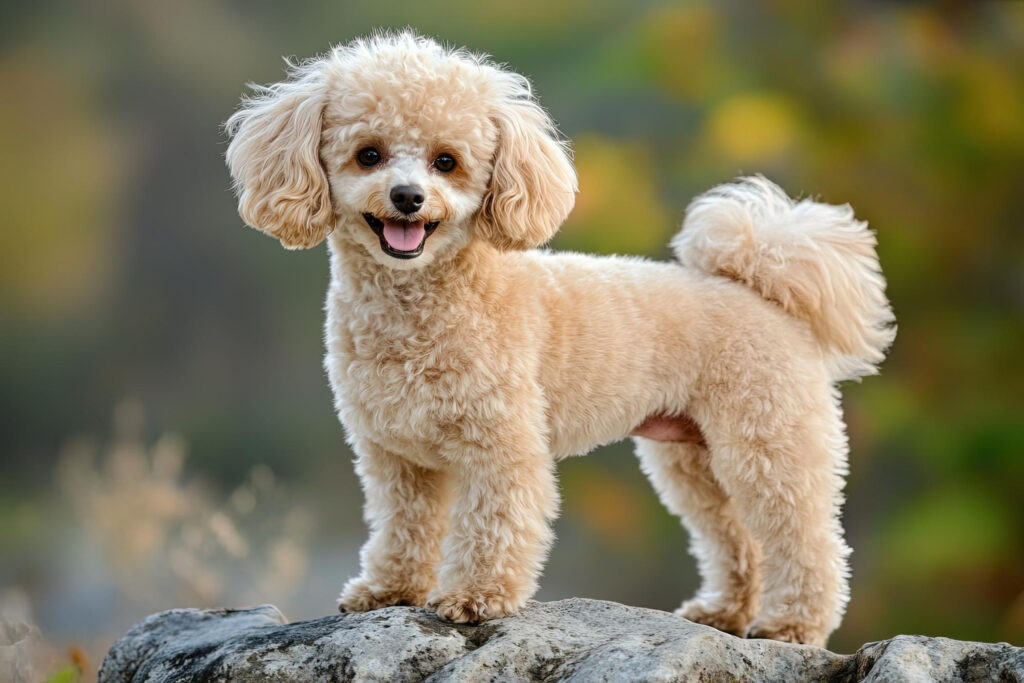When it comes to elegance, intelligence, and versatility, few dog breeds match the poodle dog. Known for their signature curls and sharp intellect, poodles have captivated pet lovers for centuries. But there’s more to this breed than meets the eye. Whether you’re considering adding a poodle to your family or already have one, this complete guide will cover everything you need from their unique traits and types to grooming, feeding, training, and health care.
The poodle dog isn’t just a showstopper at dog shows; it’s a loving companion, a loyal friend, and a great addition to homes of all kinds.
Table of Contents
ToggleWhat Makes the Poodle Dog Breed Unique?
The poodle dog is instantly recognisable, but its charm goes far beyond appearance. Here’s what makes this breed so special.
Intelligence Beyond Compare
Poodles are ranked among the smartest dog breeds. Their ability to learn commands, solve problems, and adapt to new environments makes them ideal for first-time dog owners and families alike.
Hypoallergenic Coat
Thanks to their tight, curly fur, poodles shed less than most breeds, making them one of the top choices for allergy sufferers. However, this same coat requires consistent grooming to prevent matting.
Athleticism and Energy
Whether it’s a game of fetch or agility training, poodles love to move. Their athletic build and stamina make them perfect companions for active households.
Types of Poodle Dogs: Sizes & Variations
The poodle dog breed comes in three main size varieties, each with its own personality and care requirements.
Standard Poodle
- Height: Over 15 inches
- Weight: 45–70 pounds
- Traits: Calm, noble, and a bit more reserved. Ideal for families and homes with space.
Miniature Poodle
- Height: 10–15 inches
- Weight: 15–18 pounds
- Traits: Energetic and intelligent. Great for apartments or smaller homes.
Toy Poodle
- Height: Under 10 inches
- Weight: 5–10 pounds
- Traits: Lively, affectionate, and perfect for companionship.
Personality & Temperament
Poodles are highly social animals. They thrive on interaction and get along well with both humans and other pets. The poodle dog tends to bond deeply with its family and may even develop separation anxiety if left alone too often.
They are:
- Alert and responsive
- Friendly but not overly excitable
- Quick learners who love mental challenges
This makes them ideal candidates for therapy work and even dog sports like agility and obedience trials.
Grooming & Coat Maintenance
One of the most defining features of the poodle dog is its coat. While beautiful, it’s not low maintenance.
Grooming Tips:
- Brushing: 3–4 times per week to avoid mats
- Bathing: Every 3–4 weeks using gentle dog shampoo
- Trimming: Every 6–8 weeks professionally
- Ear Cleaning: Regularly to avoid infection due to hair in ear canals
Many poodle owners opt for the classic “puppy cut” to simplify grooming. Others go for show-style grooming, but that requires far more maintenance.
Diet & Nutrition Guidelines
Poodles are active and intelligent, and their diet should reflect that. Here’s what to keep in mind:
- High-quality protein: Supports muscle maintenance
- Healthy fats: Boosts coat and skin health
- Omega-3 & 6: Great for joints and shine
- Avoid fillers: Corn and soy can cause allergies in sensitive dogs
Feeding schedule should be adjusted based on size and activity level. Toy and miniature poodles may need more frequent, smaller meals, while standard poodles do well on two daily feedings.
Training & Socialisation
Training a poodle dog is a rewarding experience due to their intelligence and eagerness to please. However, consistency is key.
Key Training Tips:
- Start socialisation early to avoid shyness
- Use positive reinforcement—poodles respond well to praise and treats
- Avoid harsh training methods; they can lead to anxiety
- Crate training is beneficial for housebreaking and safety
A well-trained poodle can perform complex tricks, learn commands quickly, and behave impeccably in various situations.
Key Training Tips:
Common Health Issues in Poodle Dogs
Although generally healthy, poodles are susceptible to some genetic and breed-specific conditions.
Watch for:
- Hip Dysplasia: Common in standard poodles
- Progressive Retinal Atrophy (PRA): Affects vision over time
- Addison’s Disease: Hormonal disorder seen in all sizes
- Epilepsy: Especially in miniature poodles
- Dental issues: More common in toy poodles due to smaller jaws
Regular vet check-ups, quality food, and responsible breeding reduce the risk of these conditions.
Ideal Living Conditions
Whether you live in a flat or a house with a garden, the poodle dog can adapt—provided it gets enough physical and mental stimulation.
Daily walk requirement:
- Toy Poodle: 20–30 mins
- Miniature Poodle: 30–45 mins
- Standard Poodle: 1 hour+
Mental stimulation through puzzle toys or training games is just as important as physical activity.
Is the Poodle Dog Right for You?
The poodle dog makes an excellent family pet, especially for those willing to invest in grooming and training. Their intelligence, affection, and beauty make them one of the most beloved dog breeds in the world.
They’re ideal for:
- Families with children
- Allergy sufferers
- Seniors looking for companionship
- First-time dog owners with time to train
Summary of Poodle Dog Key Info
Lifespan
12–15 years
Shed Level
Minimal
Temperament
Intelligent, friendly
Sizes
Standard, Miniature, Toy
Coat Type
Curly, hypoallergenic
Maintenance
High
Trainability
Excellent
Lifespan
12–15 years
Shed Level
Minimal
Temperament
Intelligent, friendly
Sizes
Standard, Miniature, Toy
Coat Type
Curly, hypoallergenic
Maintenance
High
Trainability
Excellent
History and Origin of the Poodle Dog
The poodle dog originated in Germany, bred as a water retriever. Its name comes from “Pudel,” meaning “to splash.” The breed later gained popularity in France and became associated with aristocracy. The classic grooming styles we know today were originally designed for functionality in water.
Poodle Dog in Dog Shows and Competitions
The poodle dog is a frequent top contender in obedience trials, agility courses, and dog shows. Their distinctive Continental Clip grooming style is both aesthetic and functional. Their intelligence and trainability make them stars in competitive arenas.
Popular Poodle Dog Mix Breeds (Doodles)
Crossbreeds with poodles, like Labradoodles, Goldendoodles, Cockapoos, and Bernedoodles, are increasingly popular. These mixes offer poodle-like hypoallergenic coats with the personality of other beloved breeds.
Common Myths About Poodle Dogs
Myth 1: Poodles are fragile.
Truth: Standard poodles are robust and athletic.
Myth 2: Poodles are high-maintenance lap dogs.
Truth: They’re intelligent, active, and adaptable companions.
Myth 3: Poodles bark excessively.
Truth: With training, they are generally quiet and alert.
How to Choose the Right Poodle Puppy
- Choose based on space and activity level
- Spend time with poodles if allergies are a concern
- Buy from reputable breeders
- Match temperament to your lifestyle
Poodle Dog Adoption vs. Breeder Purchase
Adoption is great for budget and compassion. Buying from breeders allows early bonding and known lineage. The choice depends on your goals and lifestyle.
1. Are poodles good with children?
Yes, especially when socialised early.
2. How often should I groom them?
Brush 3–4 times weekly and trim every 6–8 weeks.
3. Do poodles bark a lot?
Not excessively if well-trained.
4. Can poodles live in flats?
Yes. Toy and miniature poodles adapt well.
Are poodles costly to maintain?
Somewhat, due to grooming and health screenings.







